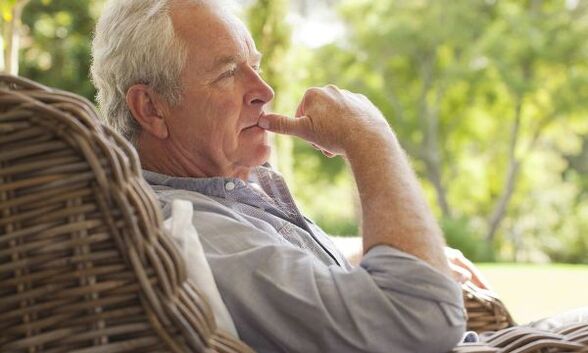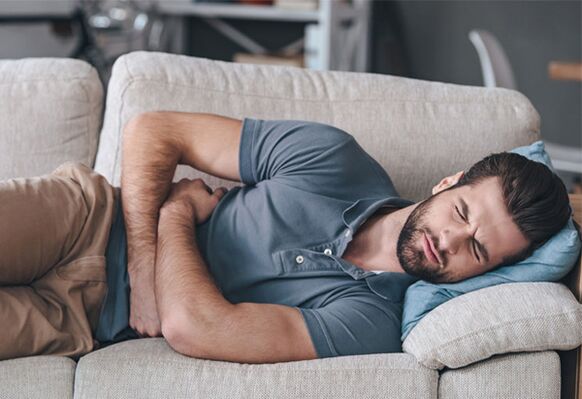With prostatitis, the inflammatory process occurs in the prostate area. This is one of the most common urinary system diseases. There are various causes of prostatitis in men.

What is prostatitis?
The disease is accompanied by violations of urination. Many times, men have a feeling that the bladder is not fully emptied.
The main cause of acute bacterial prostatitis is infection:
- Transmission in intimate relationships (ureaplasmosis, chlamydia);
- Infiltrate the urethra from the rectal area (infection with Klebsiella, Pseudomonas aeruginosa).
If the prostate is inflamed, a man's emotional state can deteriorate rapidly. In this case, libido decreases.
Deterioration of the nervous system may manifest as the following symptoms:
- anxiety;
- Deterioration of mood;
- sleep disorder;
- Increase irritability.
Where did the patient's prostatitis come from?
It is worth explaining what causes acute or chronic prostatitis in men. The likelihood of developing the disease increases under the influence of the following main factors:
- promiscuous sexual relations;
- Failure to observe basic rules of personal hygiene;
- backflow of urine into the bladder area;
- phimosis;
- low temperature;
- strong emotional shock;
- Blood stagnation in the pelvic area.
cause of disease
Causes of acquired prostatitis include:
- The urethra narrows. It causes worsening of urine outflow and increased pressure on the urethra;
- damage to the perineum, leading to the development of a chronic inflammatory process;
- Prostate stones;
- heavy physical work;
- The presence of chronic inflammatory processes in which the vessels of the prostate are affected.
acute and chronic infectious diseases
Inflammatory processes in the prostate may be the result of another disease. These conditions include: gonorrhea and urethritis. The following diseases may also contribute to the development of the disease:
- Cystitis;
- angina pectoris;
- incompletely treated caries;
- tuberculosis.
In the presence of acute or chronic foci of infection, you must first eliminate the underlying cause of the disease: the activity of neutralizing the source of infection.
congestion
Congestive (congestive) prostatitis is often accompanied by damage to testicular tissue. As a result of this pathology, a violation of spermatogenesis occurs, the process of synthesis of sex hormones slows down. Erectile dysfunction is often present with congestive prostatitis.
The risk of chronic congestive prostatitis increases with the following factors:
- low physical activity;
- pelvic floor muscle weakness;
- stay away from intimacy for a long time;
- Interrupting sexual intercourse as a way to prevent unwanted pregnancy;
- frequent constipation;
- the presence of cancer;
- reduce vascular tone;
- Complications after surgical intervention on pelvic organs;
- Pelvic varicose disease.
Treatment of congestive prostatitis involves the use of non-steroidal anti-inflammatory drugs. These medications eliminate discomfort and reduce tissue swelling.
Use antiplatelet drugs if needed. These drugs improve the blood thinning process.
For congestive prostatitis, sulfated mucopolysaccharides are introduced in the form of injections, indicating the use of niacin.
Venotonics help increase the strength of the vein walls. Drugs in the alpha-blocker group help improve urine flow. In some cases, immunomodulators, muscle relaxants, and sedatives are used when the prostate area is congested.
sedentary work
An inactive lifestyle can lead to stagnant processes in the prostate tissue. The function of the nervous and endocrine systems deteriorates due to passive recreation. Under adverse environmental conditions, the risk of developing prostatitis increases.
long-term abstinence
With prolonged abstinence, semen stagnation was observed. Pathogenic microorganisms can begin to multiply in it, triggering the inflammatory process of the prostate.
With prolonged abstinence, libido decreases. Inadequate sexual activity can also lead to impotence.
low temperature
Under the influence of hypothermia, the corresponding blood vessels narrow. In this condition, the blood supply to the prostate is disturbed, leading to deterioration of organ nutrition.
To avoid hypothermia, you need to follow simple advice:
- It is recommended to wear a jacket suitable for the season;
- It is necessary to avoid prolonged exposure to the wind near the air conditioner.

Causes of prostatitis in men after age 40
Prostate inflammation in young men develops under the influence of:
- pelvic congestion;
- There are hidden infectious diseases (chlamydia, trichomoniasis). Due to this pathology, a slow inflammatory process occurs in the prostate tissue.
Causes of prostatitis in patients over 55 years old
Disease after 55 years may occur under the influence of:
- androgen deficiency;
- the presence of pelvic floor muscle atrophy;
- Decreased immunity due to chronic infection;
- slow blood flow;
- loss of sexual function;
- Weakened sphincter muscles in the bladder area.
One of the reasons for the development of prostatitis is that the patient is overweight. Increased pressure in the venous pelvic plexus area due to the extra body weight.
Other causes of disease development
According to a psychosomatic expert (Louise Hay), a man's health depends on the state of mind of a person with a high sex drive. According to this theory, prostatitis may have the following causes:
- Feelings of not being able to control major events in life;
- Internal experience of sexual failure;
- Guilt towards partner.
Pathology is often diagnosed in older men who feel insecure about their abilities.
To prevent prostatitis from developing at this stage of life, you need to learn to think positively. A man shouldn't focus on the things that frustrate him.
Where does prostate inflammation in men hurt?
It is worth explaining the pain points of advanced prostatitis. As the disease progresses, pain occurs in the following areas of the body:
- scrotum;
- penis
- lower back;
- anal area.
Pain from prostatitis in men depends on the following factors:
- the stage of the disease;
- Localization of inflammatory foci.
Prostatitis is prolonged, and pain may occur in the area of the seminal glands and vesicles.
leg pain
It is worth knowing what the main symptoms of prostatitis are and what harm is there. When the prostate is inflamed, blood circulation is disrupted. This can cause pain in the lower extremities.
In some cases, bacterial prostatitis develops into reactive arthritis. In this case, the pain does not occur in the muscle, but in the bone tissue or joint area.
Testicular discomfort
One of the signs of the disease is perineal pain. It can spread to the penis, pubis, testicles. When the seminal vesicles are affected, discomfort in the testicles and groin fold occurs.
Unpleasant sensations of firing roles in the testis and prostate were observed during suppuration. In this case, the course of the disease is complicated by the violation of the urination process, severe weakness, fever.
Anal discomfort
The main cause of anal pain is that the prostate is located next to the rectum. At the same time, the unpleasant feeling has a shooting nature. Defecation increases discomfort.
Pain from prostate inflammation may be accompanied by constipation and gas.
coccyx pain
Coccyx pain is one of the symptoms of the disease. Discomfort is often accompanied by the sensation of a foreign body in the anus. Similar symptoms indicate a violation of the bodily functions of chronic prostatitis.
lower abdominal pain
As the disease progresses, the volume of glandular tissue in the organ increases. Lower abdominal pain is usually severe. In this case, the inflammatory process covers the bladder and rectum.
After the course of treatment, the swelling disappeared. The prostate gland shrinks in size. As a result, the pain in the lower abdomen becomes less noticeable.
pain localization
If you are in pain, you will need a full medical examination. Similar pain localization is observed in rectal disease, prostate cancer.
pain relief remedies
To eliminate discomfort, analgesics and antipyretics of the pyrazolone group are used. This tool helps relieve pain and has anti-inflammatory properties.
Diphenhydramine hydrochloride has an anesthetic effect. This tool helps to relax smooth muscles. This medicine has a sedative effect on the nervous system. NSAIDs of the sulfonamide class have significant anti-inflammatory and analgesic properties.
Effective folk remedies can also help reduce pain:
- Infusion made from burdock.10 g of pre-crushed plant roots need to be poured in 200 ml of water. Cook the product on low heat for 10 minutes. After that, infuse the broth for 30 minutes. 100ml twice a day. The decoction is taken 30 minutes before meals. The average duration of courses is set individually.
- pumpkin seeds.Eat 1 tablespoon of vegetable seeds twice a day. Pumpkin seeds should be eaten 60 minutes before meals. The average course duration varies from two to three months. Pumpkin seeds have obvious antiseptic properties.
You should consult a urologist before using pain medication. Appropriate medications may cause side effects.
Can prevent prostatitis, its psychosomatic disease is very complex. This requires: moderate physical exercise, a balanced diet, abstain from bad habits, and regular sexual relations.




































